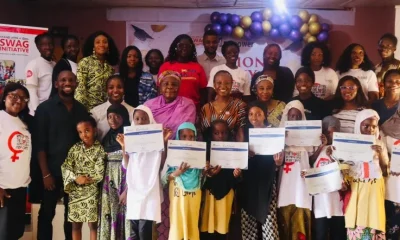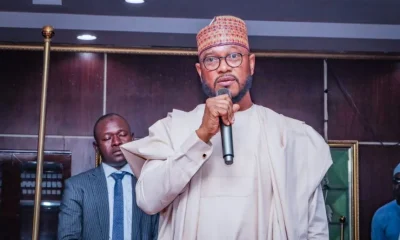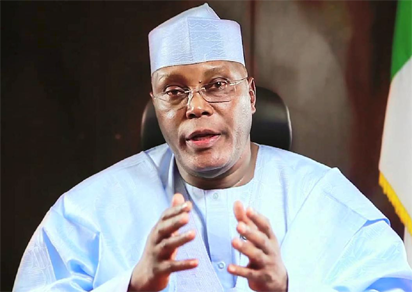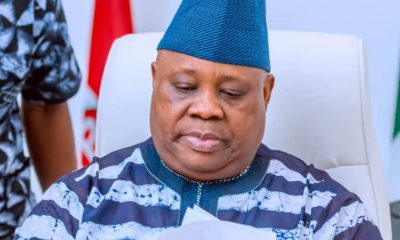News
Education Budget: Any hope?

Challenges
There is no doubt that the problem of low budgetary allocations, particularly to the education sector has remained the major clog besetting the supposed fulcrum of national development. Over the years, the story of budgetary allocations to education has been of hopelessness and forlorn expectations. This is as in the past 24 years of civilian administration, in the country, the yearly poor sectoral allocation to education, is yet to address or mitigate the rot in the system due to age-long neglect, thereby fueling concern and doubt among stakeholders about the commitment of successive governments to tackle the decay in the sector. Unfortunately, given the poor allocations, the expectations of most Nigerians and critical stakeholders for an improved education system that will reposition the country and stimulate technological emancipation through the delivery of qualitative education have consistently been a dashed hope. Today, the sector owing to the challenges of poor funding is awash with unresolved crises of incessant strikes by various staff unions in the system, dearth of facilities and equipment for quality teachinglearning and cutting-edge research, unstable academic calendar in almost all public higher institutions in the country, hike in school fees and shortage of lecturers; while at the primary and secondary school levels, apart from the problem of insufficient quality teachers, students and pupils are still sitting on floors to receive lessons for lack and shortage of classroom furniture, in most instances. More worrisome is the challenge of insecurity, which led to a series of attacks on schools, and abduction or kidnapping of teachers and students, as well as the death of many teachers and students in the process. This has adversely triggered and resulted in rising figures of out-of-school children especially in most states in the North, which places Nigeria ahead of other countries in Sub-Saharan Africa, a development which is still steering the country in the face. Most recently is the problem of alarming mass exodus (otherwise known as JAPA) of qualified lecturers and other categories of workers who are leaving the system in droves due to poor staff welfare and remuneration, as well as the unsafe learning environment.
Allocations
Despite the plethora of challenges confronting the education sector, the Federal Government’s move so far to fund the sector in the past 24 years, has consistently been abysmal and mismatched. To this end, the yearly budgetary allocations have remained lower than 10 per cent of the nation’s total fiscal budget outlay, which has been overwhelmingly condemned by stakeholders for failure and lack of deliberate effort on the part of the government at federal and state levels to address the rot in the school system. For instance, in 2022, the federal allocations to education sector stood at N1.18 trillion, representing 7.2 per cent of the total Federal Government budget outlay of N17.126 trillion; while in the outgoing 2023, out of the N20.51 trillion federal budget presented by former President Muhammadu Buhari to the joint session of the National Assembly, the government earmarked N1.79 trillion, which represents 8.8 per cent to the sector. Again, in the 2024 proposed budgetary estimate of N27.5 trillion, christened “A Budget of Renewed Hope,” and which is said to place security, economy, education, health and poverty alleviation as its core priorities, presented by President Bola Tinubu to the joint session of the National Assembly, education sector got N2.18 trillion, representing 7.9 per cent of the total budget.
Stakeholders
Against this backdrop, critical stakeholders in the nation’s education sector have widely condemned the President Tinubu-led Federal Government over what they described as meagre allocation to education, and which they claimed is akin to scratching the surface as the budget is nowhere to tackle the monumental decay in the sector. According to them, any responsive government that prides itself as “a lover of education” and regard education as the bedrock of national development, should as a matter of exigency set in motion a deliberate financial plan that would place education as a top priority in the scheme of its policies. Meanwhile, placed in the context of real value in the face of the current devaluation of the nation’s currency, inflation rate and the harsh economic situation of the country following the removal of oil subsidy, stakeholders described the budget figure and percentage as laughable, insisting that it cannot as expected right the wrong in the sector. Appraising sectoral budget allocations, management, implementation and administration in the country, the stakeholders raised questions about what quantum of the budget that usually goes into the implementation of the real sector as appropriated.
They, however, blamed the lacklustre in the system to corruption, poor implementation strategies, and non-release of the budget as necessary by the concerned authorities. Meanwhile, in his analysis of the education sector budget proposal for 2024, a don and Professor of Transport Administration at Lagos State University, Prof Samuel Odewumi, said the percentages are very miniscule when juxtaposed with the plethora of needs of the sector. While describing as “paltry” in view of the unresolved challenges that need to be fixed in the sector, he however noted that the figure is one thing, but the most important issue is what purpose the budget was assigned, in terms of what it would financially back up. Odewumi, who expressed discomfiture with the trends of budget allocations to the sector over the years, and that 2024 is not an exception, therefore insisted that to rescue the sector, it is important that the student’s loan scheme, introduced recently by the Federal Government is perfected so that institutions can increase their internally generated revenue (IGR) from sustainable school fees. But, according to him, this should not excuse the federal and state governments from proper funding and appropriating at least 15 per cent of the fiscal budget to the education sector. For the budget to be meaningful and address the needs of the sector, the don suggested that the issue of appropriate remuneration and staff welfare should be critical in order to slow down the JAPA or mass exodus of lecturers currently rocking the nation’s tertiary institutions.
Also, on his part, the National President of the Academic Staff Union of Polytechnics (ASUP), Anderson Ezeibe, who expressed concern over the low budgetary allocation to the sector, said from analysis of the sectoral allocation proposed by the administration of President Tinubu to education in 2024 budget, it was obvious that no significant improvement is being seen that will dovetail to the transforming the sector during the year. “It is still business as usual. This is unimpressive and an extension of a trend that has seen education receiving less than eight per cent of the allocation consistently for several years now,” the ASUP President lamented, saying the budget is certainly not adequate to reverse the rot in the sector, particularly when the allocation is placed in the context of real value bearing in mind the devaluation of the nation’s currency. Therefore, Ezeibe, who said there was the need for improved budgetary allocation to education sector in view of the challenges at every level of the nation’s education system, further explained: “Now that the budget proposal is still before the National Assembly, the union expects an appropriate review to reflect the current and future needs of the education sector, if the government is ready to tackle the problems as the President earlier promised Nigerians.” The Vice-Chancellor, Ahman Pategi University, a private university in Patigi, Kwara State, Prof Mahfouz Adedimeji, expressed worry over what he described as the consistent trend of poor budget allocations to education by successive administrations at both the federal and state levels.
Given the fact that education is the foundation of all development, the don, therefore, said that it ordinarily requires more than a fair share of the nation’s yearly fiscal budget, if not the lion’s share of the budget. Adedimeji said: “Though the 2024 budget proposal is a relatively significant leap from N1.79 trillion budgeted in the 2023 to N2.18 trillion in 2024, the percentile allocation to education has dropped from 8.8 per cent of the budget this year to 7.9 per cent for next year. “This shortfall, I think, should be addressed through the supplementary budget to show that we are moving forward and determined as a country to make the education sector a priority. “Though the issue of UNESCO benchmark or recommendation of a minimum of 26 per cent of national budgets to education has been proven to be a myth, it is still instructive that none of the E9 (Bangladesh, Brazil, China, Egypt, India, Indonesia, Mexico, Nigeria and Pakistan) or D8 countries (Bangladesh, Egypt, Nigeria, Indonesia, Iran, Malaysia, Pakistan, and Turkey) other than Nigeria, usually allocates less than 20 per cent of its annual budget to education. “In other words, we are an exception in this regard, and the implication of this is that we can do better and toe the same line to accord education more priority and be like our E9 and D8 counterparts.” On the strength of the “Renewed Hope Agenda” of President Tinubu administration, I believe the government can do more to assure Nigerians, especially the critical stakeholders that there is hope for our education. While calling on the government to do better for the education sector, Adedimeji further noted: “It is through improved funding of education that we can guarantee quality, increase access, promote excellence and build confidence in the sector.”
More reactions
Also, while describing the budget allocation as “insignificant” given the challenges in the sector, a retired Professor of African Literature and Poetry, and former Dean of Faculty of Arts, University of Ibadan, Prof Ademola Dasylva, expressed regrets that no government in Nigeria has ever respected the 26 per cent of a nation’s annual budget as recommended by UNESCO. According to him, the closest a Nigerian government had ever gone was about 10 per cent, even that was done at a time the country’s economy was buoyant, and could accommodate the UNESCO benchmark of the country’s annual budget. Dasylva, a social critic and analyst, stated that he suspected that citizens’ access to quality education seems to be a threatening issue for the government to deprive the sector of proper funding, saying the political class and their elitecollaborators are “frightened” by the idea of having an enlightened citizenry. He said: “So, they are doing everything possible to stifle access to good and quality education through underfunding and deliberate neglect of infrastructural facilities.
Unfortunately, no nation’s leadership in its right mind will, for example, take a loan purposely to pursue inanities, such as the purchase of an SUV at N160 million for each of its lawmakers, because according to them the roads are unmotorable. “You can see how logic is being forced to stand on its head. Laughable, isn’t it? So, the answer to bad and unmotorable roads in Nigeria, is not appropriately fixing the roads, rather the solution is buying Armoured Jeeps that could conquer the roads, and not fix it. “Such a humongous amount of money could go a long way in fixing and filling the gaps in our education system. Past governments, and the current one under the watch of President Bola Tinubu have never pretended to make education across the tiers a priority.”
Though not too differ in his appraisal of the sectoral allocation for 2024, Prof Francis Egbokhare, an academic linguist and the immediate past President of the Nigerian Academy of Letters (NAL), explained that tackling the rot in the system could not be done with one budget allocation. However, Egbokhare, a don at the University of Ibadan, said the budget figure for education is going up, the real issue is not appropriation but that of actual release of the figure for the system. Apart from the problem of low budget allocation and management, Egbokhare also noted that there is a real possibility of collapse of public universities due to practices that do not depend on budgets. For instance, he pointed out that there is the problem of high level corruption introduced by the Integrated Payroll and Personnel Information System (IPPIS), and again the fact that at least a third of appointments in federal public universities are imposed by civil servants and politicians on the management of these institutions.
“In state universities, there is a total disregard of competence in employment. Politicians and top civil servants have taken over staff resourcing. Add to this, is the shady practices by universities in hiring mercenaries for accreditation and the fact that many universities run up to three sessions concurrently just to raise money,” he added. The don, who lamented that we have more crises in our hands beyond budgetary allocation, said despite that quality education depends critically on the quality of staff, “we have a massive brain drain in progress as most staff are demotivated and depressed from poverty and disregard for their realities,” Egbokhare insisted that if the government pumps money into the sector without elevating the quality of the work environment and income of staff, it will go down the drain, saying it is high time for the government to be more serious about education at all levels. Further on the challenges in the sector, the don noted: “To date, we have approached interventions through special purpose vehicles and spending opportunities which are couched in terms of workshops and retreats. There is severe execution gaps in the system, an excessive fixation on building and construction to the detriment of teaching-learningresearch capacities and support frameworks.”
ASUU
Speaking on the sectoral budget, the National President of the Academic Staff Union of Universities (ASUU), Prof Emmanuel Osodeke, said nothing has changed going by the President’s budget proposal to education. The union leader, who lamented that the budget is less in quantum especially in figure and percentile, said what ASUU, like other stakeholders, expected was nothing less than 15 per cent of the national budget for the sector in 2024. “What we have now is even less than what the sector was having before. Though we are still studying the budget, we are at the same afraid that this will not change anything. “The budget cannot take the sector anywhere in terms of value, inflation and current exchange rate. To us, as a union, nothing has really changed in the sector,” ASUU President stated.
Suggestions
Therefore, as part of the way forward, Egbokhare stated that in increasing funding to the system, there is the need to return to autonomy, while on the other hand competent governing councils should be appointed by the government for the institutions, as well as develop instruments and tools for performance management, and to minimise direct access to institutions in the name of oversight. He said: “These oversights are often extortion opportunities rather than rational oversight. Technology can upend transaction costs and reduce the cost of training by as much as 60 per cent. The government should redefine and redesign approaches to oversight and accreditation of academic programmes.”
Source: New Telegraph
-

 Entertainment4 days ago
Entertainment4 days agoNigerian Singer, Ifunanaya, Died After Snake Bite In Abuja
-
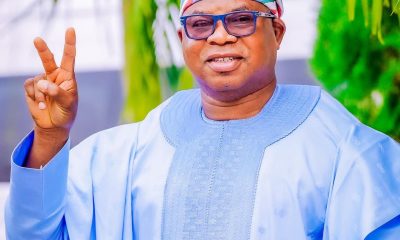
 Opinion5 days ago
Opinion5 days agoBola Oyebamiji: Beyond Skelewu Dancer: The Rising Technocrat Poised To Govern Osun State In 2026 By Wale Atoba
-

 News4 days ago
News4 days ago20-Year-Old College Student Found Dead With Body Parts Missing In Kogi
-
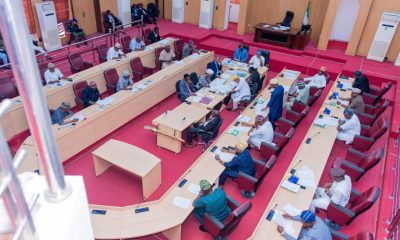
 News4 days ago
News4 days agoOsun Assembly Warns UBA, Oyetola, APC Over Alleged Diversion Of Osun LG Funds



